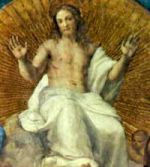Fathers of the Church
Epistle CXXXV: to Sophronius, Prefect of Constantinople
by Gregory Nazianzen in 382 | translated by Charles Gordon Browne, M.A., James Edward Swallow, M.A
I am philosophizing at leisure. That is the injury my enemies have done me, and I should be glad if they would do more of the same sort, that I might look upon them still more as benefactors. For it often happens that those who are wronged get a benefit, while they, whom we would treat well, suffer injury. That is the state of my affairs. But if I cannot make every one believe this, I am very anxious, that at all events you, for them all, to whom I most willingly give an account of my affairs, should know, or rather I feel certain that you do know it, and can persuade those who do not. You, however, I beg to give all diligence, now at any rate, if you have not done so before, to bring together to one voice and mind the sections of the world that are so unhappily divided; and above all if you should perceive, as I have observed, that they are divided not on account of the Faith, but by petty private interests. To succeed in doing this would earn you a reward; and my retirement would have less to grieve over if I could see that I did not grasp at it to no purpose, but was like a Jonas, willingly casting myself into the sea, that the storm might cease and the sailors be saved. If, however, they are still as storm-tost as ever, I at all events have done what I could.
Taken from "The Early Church Fathers and Other Works" originally published by Wm. B. Eerdmans Pub. Co. in English in Edinburgh, Scotland, beginning in 1867. (LNPF II/VII, Schaff and Wace). The digital version is by The Electronic Bible Society, P.O. Box 701356, Dallas, TX 75370, 214-407-WORD.






